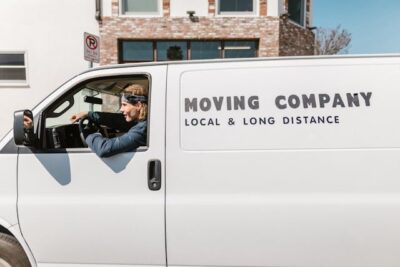Americans move an average of 11.7 times during their lifetime, so there will always be demand for professional moving services. In 2023, the average moving company pocketed between $90 and $150 per hour, translating into substantial earnings ranging from $244 to $407 per move. This growth isn’t limited to big cities; even in places like Birmingham, AL, hourly earnings on labor-only moves reached an impressive $146, and states like Mississippi report a staggering 434 moves per registered moving company. Making a moving business an attractive option for entrepreneurs.
Research and planning
Before starting your business, conduct thorough research to understand the moving industry, and get the knowledge and insights needed to make informed decisions. Without careful planning, you could run into many problems as you go, which can end up costing you more money, time, and other resources.
Conduct a market analysis
Focus on the area(s) you want to serve. Your market analysis should include a study of your competition to identify their strengths, weaknesses, and areas where you can differentiate yourself. Develop your unique value proposition. Next, try to understand your target market by asking yourself if you’ll cater to residential clients, commercial businesses, or both. What are your potential clients’ specific needs and pain points? The answers to these questions will help you adjust your services to effectively meet the demands of your target audience.
Legal requirements and regulations
As with any business, ensuring compliance with legal requirements and regulations is essential when starting. Here’s a closer look at the points you need to consider:
Business type
The first decision you’ll need to make is choosing the most suitable business structure for your moving company. Common options include:
- Sole proprietorship: As the simplest form of business ownership, a sole proprietorship involves operating the business as an individual. While it offers easy setup and complete control over operations, it also means personal liability for business debts and obligations.
- Partnership: A partnership structure may be appropriate if you start the business with one or more partners. You can choose a general partnership, meaning that partners share equal responsibility and liability, or opt for a limited partnership, where some partners have limited liability.
- Limited Liability Company (LLC): An LLC protects your personal assets from business liabilities and allows for pass-through taxation, where you report your profits and losses are reported on your personal tax returns.
- Corporation: This is a separate legal entity from its owners, providing the highest personal liability protection. However, it involves more complex formation and governance requirements, such as issuing stock and holding regular meetings.
Licensing
Obtaining the necessary licenses is essential for legally operating a legit moving company. The required licenses may vary depending on which state you’re located in, but they commonly include the following:
- Motor Carrier Authority: If transporting goods across state lines, you must obtain motor carrier authority from the Federal Motor Carrier Safety Administration (FMCSA).
- State and local permits: Many states and local jurisdictions require moving companies to obtain permits to operate within their boundaries. These permits may include a state-issued household goods carrier license and local business permits.
- Vehicle registration: All vehicles used for transporting goods must be appropriately registered and insured. Check your state and federal regulations regarding vehicle registration and insurance coverage.
Insurance
Getting adequate insurance coverage protects your business, employees, and clients. Here are some types of insurance commonly required for moving companies:
- Cargo insurance: Covers the value of goods transported in case of damage or loss during transit.
- Liability insurance: General liability insurance shields your business against claims of bodily injury or property damage occurring on the job.
- Workers’ compensation insurance: If you people working for you, this covers their medical expenses and lost wages in case of work-related injuries or illnesses.
Permits
In addition to licenses, you may need to obtain certain permits to operate legally. These permits may include:
- DOT Number: If your vehicles are involved in interstate commerce, you’ll need a Department of Transportation (DOT) number issued by the FMCSA.
- Weight and size permits: Depending on the size and weight of your moving vehicles, you may need permits for oversized or overweight loads.
Obtaining the proper licenses and permits mitigates the risk of fines, penalties, or legal disputes down the road.
Creating a business plan
A business plan provides a clear strategy for success. It helps articulate your vision and goals, guides strategic decision-making, identifies and mitigates risks, allocates resources effectively, and checks financial viability. It can also help stakeholders and investors understand your business concept and growth potential.
A good business plan outlines your objectives, strategies, and operational procedures. Start by defining your services—are you offering local or long-distance moves? Will you provide additional services such as packing, unpacking, or storage? Think of a pricing strategy that is competitive yet profitable. Consider distance, size of the move, and additional services provided. Establish your branding—what sets your moving company apart from the competition? Communicate your brand identity to potential clients, whether it’s exceptional customer service or eco-friendly practices.
Setting up operations
If you want to achieve efficiency and excellence in service delivery, you’ll need to think about the operational strategy for your moving company.
Procuring equipment and supplies
Investing in the right equipment and supplies is necessary for the smooth functioning of your moving operations. This includes procuring a fleet of reliable trucks of different sizes to meet the needs of different types of moves, from small residential relocations to large-scale commercial transitions. To promise your clients safe and secure transportation of their belongings, stock up on high-quality packing materials such as boxes, tape, bubble wrap, and furniture blankets. Additionally, equip your team with essential tools like dollies, hand trucks, and moving straps to facilitate efficient loading and unloading.
Hiring and training staff
Your team is the backbone of your moving company, so hiring and training the right personnel is crucial. You’ll need at least one crew member to help you with moves. Look for individuals who are physically capable of handling the job’s demands. Your team member(s) should also possess excellent communication and customer service skills. If you’re hiring both movers and drivers, ensure that movers are experts in safely and efficiently transporting items, while drivers must have clean driving records and knowledge of traffic regulations. Customer service representatives play an important role in providing clients with a positive experience, so they must be well-trained in handling inquiries, scheduling moves, and resolving issues promptly and politely.
Establishing partnerships
If you want to enhance your moving company’s reach and capabilities, you can establish relationships with local real estate agencies or construction companies to tap into their network of clients who may require moving services. Collaborating with storage facilities allows you to offer clients convenient storage solutions for their belongings during transitions. Partnering with packing services can also streamline the moving process for clients who prefer assistance with packing and unpacking. These partnerships help broaden your service offerings and provide added value to your clients.
Improving delivery and route planning
After you’ve set up your business operations, you might think of ways to improve logistics and customer satisfaction. One way to do so is through efficient delivery and route planning. If you can provide clients with a smooth experience, they will likely recommend your business and leave positive reviews.
Efficient route optimization
Technology has revolutionized route optimization in the moving industry, allowing companies to streamline operations and improve efficiency. Advanced route optimization software utilizes sophisticated algorithms to calculate the most efficient routes for moving trucks, considering traffic patterns, distance, and delivery schedules. The software generates optimized routes that minimize travel time and fuel consumption by inputting the addresses of pick-up and drop-off locations.
A benefit of route optimization technology is its ability to adapt to real-time changes. If unexpected road closures, accidents, or traffic jams occur, the software can quickly recalculate routes to avoid delays and ensure on-time deliveries. Route optimization technology also has environmental benefits. By minimizing travel distance and fuel consumption, companies reduce their carbon footprint and contribute to sustainability efforts.
Implementing delivery scheduling software
Delivery scheduling software offers a solution for efficiently managing and organizing moving appointments.
With all appointments stored in one centralized database, accessing and managing your schedule becomes easy, eliminating the need for ineffective spreadsheets or paper-based systems. This software uses real-time updates and synchronization across multiple devices so everyone on your team can access the latest information. Automated reminders notify your team members and clients about appointments, reducing the risk of missed appointments and scheduling conflicts.
Marketing for your moving business
If you own a business, you must have effective marketing to promote and attract new clients. Marketing tactics can increase brand awareness, generate leads, and ultimately grow your business.
Building an online presence
A strong online presence is indispensable for any business, including moving companies. The basis of your online presence is a well-designed and functioning website. It should provide potential clients with complete and transparent information about your services, pricing, and contact details. Besides, your site should be user-friendly and optimized for mobile devices. Include high-quality, informative content that addresses common questions and concerns related to moving and incorporates relevant keywords naturally throughout.
Social media platforms offer valuable opportunities to engage with your target audience and present your services. Find out which platforms your audience uses. Popular social media platforms are LinkedIn, Facebook, and Instagram. Post updates, tips, and behind-the-scenes content regularly to keep your followers engaged. Besides organic reach, social media advertising helps you target specific demographics and geographic locations, increasing your reach and attracting potential clients.
Other online marketing tactics that will help promote your moving company further and attract new clients are email marketing, pay-per-click (PPC) advertising, and content marketing.

Starting a moving company presents an excellent opportunity for entrepreneurs seeking to enter the growing moving industry. The basis of a successful moving business is built through research and planning, setting up efficient operations, implementing technology for optimizing logistics, and using marketing tactics to build an online presence. You’ll encounter challenges on the way—the best you can do is use the tools and strategies to find effective solutions.









 The 2024 virtual Men’s Round Table will be held Q4, 2024, date TBD.
The 2024 virtual Men’s Round Table will be held Q4, 2024, date TBD.













